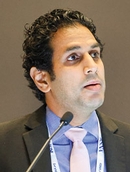An AI-based model can identify women at risk for heart disease on mammography, potentially speeding lifesaving interventions, according to research presented Tuesday.

Parghi
Calcium deposits in the breast arteries have been linked with medium and large vessel atherosclerosis, which can lead to heart disease. Women with breast arterial calcification are 51% more likely to develop heart disease than those without the condition, according to study lead author Chirag R. Parghi, MD, MBA, chief medical officer at Solis Mammography.
"Women are being diagnosed with heart attacks at an unprecedented rate, particularly young women," Dr. Parghi said. "We poorly understand who is going to get heart disease in women."
By detecting breast artery calcification, mammographic screening for breast cancer represents a largely untapped opportunity for early detection of heart disease.
Dr. Parghi and colleagues developed a deep learning AI algorithm trained on an internal dataset of 2D mammograms to detect breast arterial calcification. The algorithm provides an assessment score of 0 to 5 for breast arterial calcification according to the total area of breast arterial calcification and its density.
The researchers validated and tested the algorithm's accuracy in a large screening population of 15,000 women across 15 screening sites.
Breast Arterial Calcification Incidence Increases With Age
The AI algorithm demonstrated high accuracy in breast arterial calcification detection. As expected, it showed that a prevalence and distribution of breast arterial calcification increased with age in a screening population. Prevalence rose from 4% in women less than 50 years old to 40.8% in women ages 70 or older. The overall prevalence of breast arterial calcification detected by the AI algorithm was 14.8%.
"We have an opportunity to inform these patients that they have a finding that may require additional cardiovascular surveillance," Dr. Parghi said. "At Solis, we're going to do over a million mammograms this year. That's over 150,000 women who can be seen by a cardiologist."
With traditional reporting, patients often are not informed about any breast arterial calcification, Dr. Parghi said. But with the AI overlay, the patient can be notified during the mammography visit.
"Women obtaining a screening mammogram could also find out whether breast arterial calcification is present on the mammogram and to what extent," Dr. Parghi said. "They could subsequently speak to their physicians about a broader cardiovascular screening to assess whether they need medical optimization or additional testing."
Future research will focus on developing and deploying AI tools to use as a screening mechanism across a large screening database; an effort that Dr. Parghi linked to the theme of this year's meeting: Leading Through Change.
"As we continue to focus on how we lead through change, we need to change the way we think about incidental findings," he said. "Are they really incidental findings or are they opportunities to inform patients about their unique opportunities to intervene early? We talk about early detection for breast cancer, maybe we need to think about early detection for other diseases."
Access the presentation, "Artificial Intelligence Assessment of Breast Arterial Calcifications on Mammography in a Large Screening Population," (T3-SBSBR05-02) on demand at Meeting.RSNA.org

